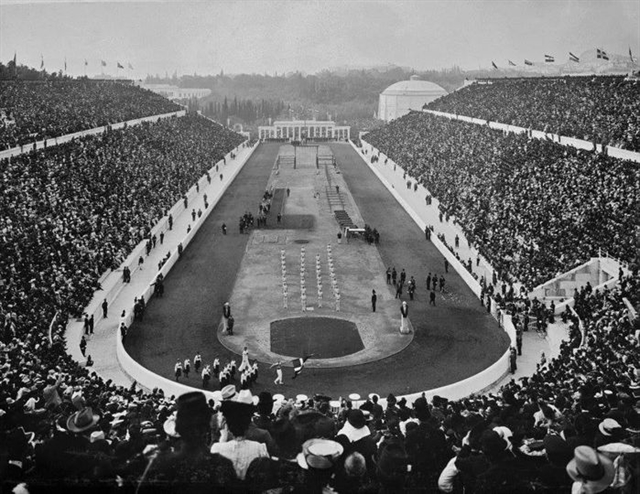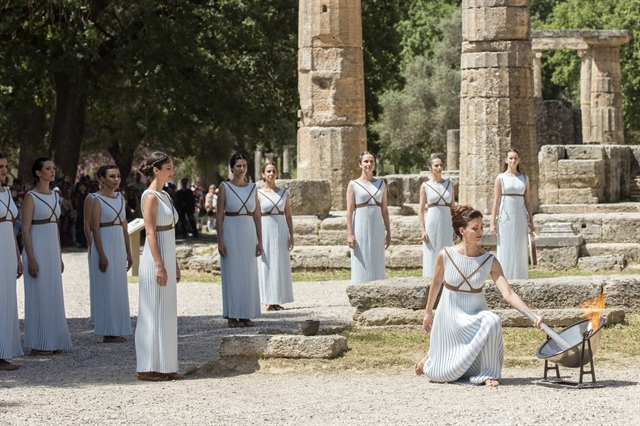 Life & Style
Life & Style

Greek Ambassador Georgios Stilianopoulos writes to Việt Nam News on the occasion of Olympic Games 2020 in Tokyo.
On the occasion of the upcoming XXXII Tokyo Olympiad, in my capacity as Ambassador of Greece in Việt Nam, but also as a Greek citizen - Greece being the birthplace of the Olympic Games - I would like to share with your readers some information regarding the history of the world's top sporting event.
Since antiquity, the Olympic Games have been an event that brings people together every four years, in the name of what the British would later term "sport".

|
| The first modern Olympic Games were held in Athens, at Panathenaic Stadium, on April 6, 1896. Courtesy Photo of the embassy |
The area of Olympia and the site of the sanctuary were inhabited as far back as Early Helladic times (3000 BC). At the end of the Mycenaean Age (1100 BC), the cult of Zeus was established in the sanctuary, which was named Olympia after Mount Olympos, the mythical abode of the gods.
The ancient Greeks believed that the Olympian gods themselves inaugurated the Games at Olympia. The myth says that Heracles organised the first track events: he determined the site and size of the first stadium, established the first foot race, and crowned the winner with a "kotinos", a branch of wild olive from the tree he himself had planted at Olympia.
The sanctuary of Olympia was quickly recognised throughout Greece as the paramount competitive and religious centre, renowned throughout the then-known world. In order to ensure the safe movement of athletes and spectators-pilgrims to the sanctuary and the smooth conduct of the games, a "Sacred Truce" was declared: all hostilities between Greek city-states had to cease for a month.
The first Olympiad was held in 776 BC. This year also marks the beginning of historical times for Greek antiquity. The games were held every fifth year and from Classical times onwards lasted five days. The intermediate four-year period was called an Olympiad. It is known that the games took place during the midsummer full moon, which fluctuated between the last week in July and the first half of August.
A year before the beginning of the new Olympiad, the officials responsible for the games sent heralds to every corner of Greece and to all the Greek colonies that were dispersed throughout the Mediterranean. These heralds announced the date of the opening of the games and consequently of the Sacred Truce, imposing hereby the cessation of all hostilities between the Greek city-states, as well as the deferment of all sentences of capital punishment.

|
| Olympic Flame lighting Ceremony. Courtesy Photo of the embassy |
The numerous city-states were all represented at these festive panhellenic gatherings at Olympia, not only by athletes but also by official emissaries who frequently stressed their presence by making splendid appearances. Rhetorical events took place on the fringe of the games, such as the delivery of important speeches of ecumenical content and appeals by orators, historians, and philosophers.
For several centuries the Games continued to be held every four years. By the time the Romans arrived in Greece, in 146 BC, there had already been some serious infractions to the Truce. However, the Games flourished anew during the reign of Roman Emperor Hadrian, when the installations in the sanctuary were modernized and enlarged.
The Games continued to be held until AD 393, when the Byzantine Emperor Theodosius I issued a decree forbidding them. In AD 426 the Emperor Theodosius II ratified their abolition.
The modern Olympic Games was revived in 1896 by Frenchman Baron Pierre de Coubertin, with the inspired and decisive support of the Greek writer Demetrios Vikelas who became the first President of the International Olympic Committee. Apart from the period of the two World Wars, the games have since been held every four years in one of the world’s major cities, with the participation of athletes from an ever-growing number of countries.
Greece, as the birthplace of the Olympic Games, is always trying to reinforce the ideals of peace, friendship, mutual understanding, sporting spirit, fair play, ethical conduct, sense of dignity, and peaceful coexistence between peoples. The goal is to contribute to building a peaceful and better world by educating youth through sport practiced without discrimination of any kind.
This year's Olympic Games will be held under unprecedented and adverse conditions, due to the numerous obstacles created by the Covid-19 pandemic. Despite the restrictions, I wish Tokyo's Olympic Games to be a new banner of solidarity and peace between peoples. I also hope that the only challenges between nations will always be of a sporting nature and that the Olympic ideals and spirit will prevail once more.
In conclusion, I am addressing my best wishes for safe Games to the Japanese organisers, for unforgettable dream Games, and every success to the Vietnamese athletes. VNS